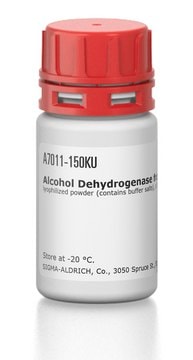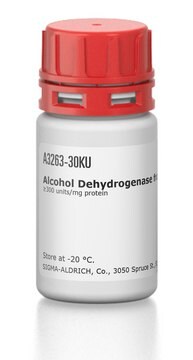55689
Alcohol Dehydrogenase equine
recombinant, expressed in E. coli, ≥0.5 U/mg
Synonym(s):
ADH
Sign Into View Organizational & Contract Pricing
All Photos(1)
About This Item
Recommended Products
recombinant
expressed in E. coli
Quality Level
description
Isozyme E sequence
form
lyophilized powder
specific activity
≥0.5 U/mg
storage temp.
−20°C
Looking for similar products? Visit Product Comparison Guide
Biochem/physiol Actions
Alcohol dehydrogenase catalyzes the oxidative conversion of alcohol into aldehyde. It has a homodimeric structure with a co-enzyme binding domain at the C-terminal and an N-terminal catalytic domain. The active site is located at the interdomain cleft. Binding of NAD+ in the active site causes conformational changes which create the binding site for the alcohol substrate.
Unit Definition
1 U corresponds to the amount of enzyme which reduces 1 μmol benzaldehyde per minute at pH 7.0 and 30 °C.
Signal Word
Danger
Hazard Statements
Precautionary Statements
Hazard Classifications
Resp. Sens. 1
Storage Class Code
11 - Combustible Solids
WGK
WGK 1
Flash Point(F)
Not applicable
Flash Point(C)
Not applicable
Certificates of Analysis (COA)
Search for Certificates of Analysis (COA) by entering the products Lot/Batch Number. Lot and Batch Numbers can be found on a product’s label following the words ‘Lot’ or ‘Batch’.
Already Own This Product?
Find documentation for the products that you have recently purchased in the Document Library.
Ioanna A Gorbunova et al.
The journal of physical chemistry. B, 125(34), 9692-9707 (2021-08-20)
The dynamics of polarized fluorescence in NADH in alcohol dehydrogenase (ADH) in buffer solution has been studied using the TCSPC spectroscopy. A global fit procedure was used for determination of the fluorescence parameters from experiment. The interpretation of the results
Steven Hayward et al.
Biophysical journal, 91(5), 1823-1831 (2006-05-23)
Horse liver alcohol dehydrogenase is a homodimer, the protomer having a coenzyme-binding domain and a catalytic domain. Using all available x-ray structures and 50 ns of molecular dynamics simulations, we investigated the mechanism of NAD+-induced domain closure. When the well-known
Structure of a triclinic ternary complex of horse liver alcohol dehydrogenase at 2.9 A resolution.
H Eklund et al.
Journal of molecular biology, 146(4), 561-587 (1981-03-15)
F Colonna-Cesari et al.
The Journal of biological chemistry, 261(32), 15273-15280 (1986-11-15)
A study of the hinge bending mode in the enzyme liver alcohol dehydrogenase is made by use of empirical energy functions. The enzyme is a dimer, with each monomer composed of a coenzyme binding domain and a catalytic domain with
H Eklund et al.
Biochemistry, 23(25), 5982-5996 (1984-12-04)
The binding of NAD to liver alcohol dehydrogenase has been studied in four different ternary complexes by using crystallographic methods. These complexes crystallize isomorphously in a triclinic crystal form which contains the whole dimer of the enzyme in the asymmetric
Our team of scientists has experience in all areas of research including Life Science, Material Science, Chemical Synthesis, Chromatography, Analytical and many others.
Contact Technical Service






